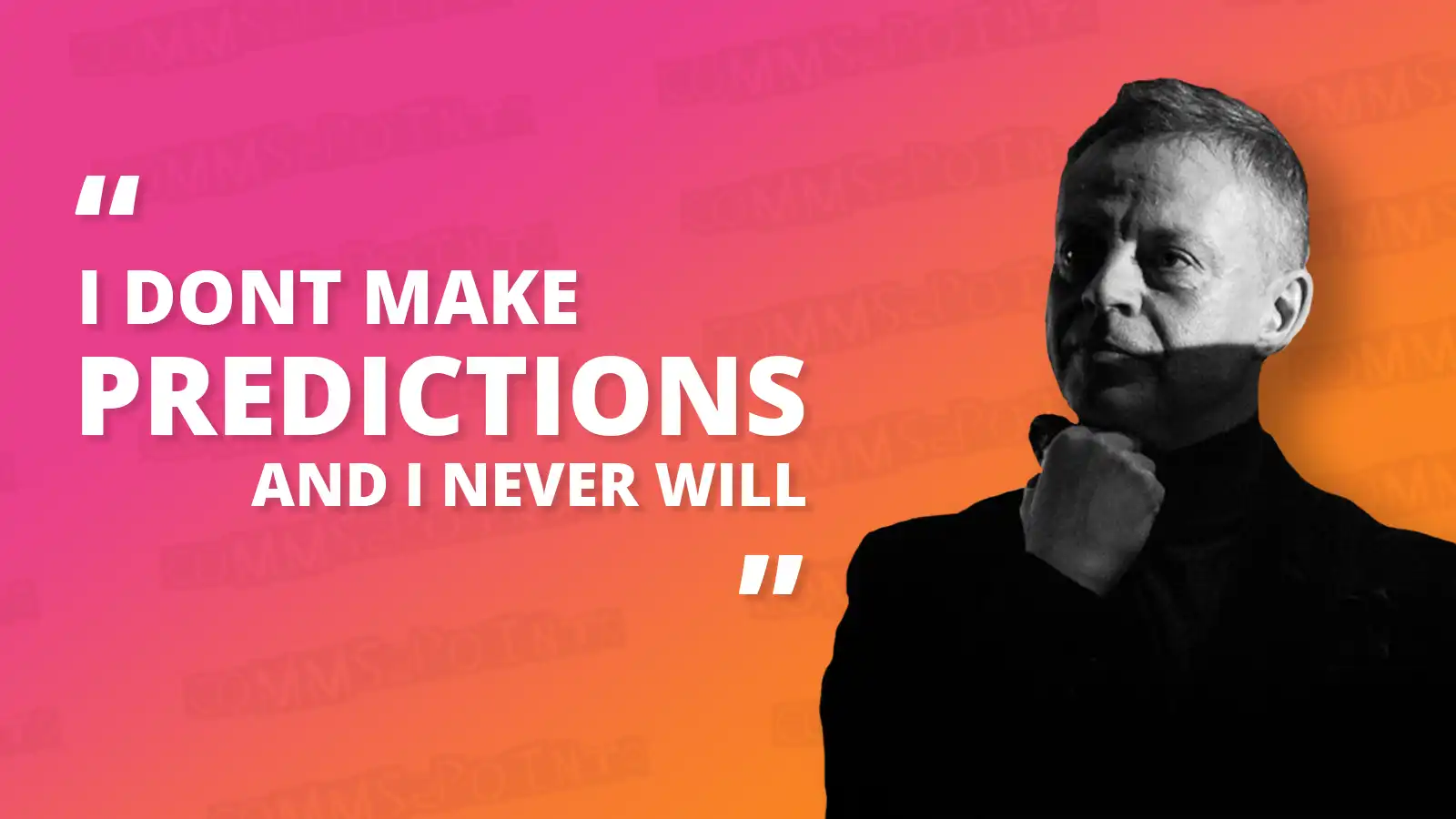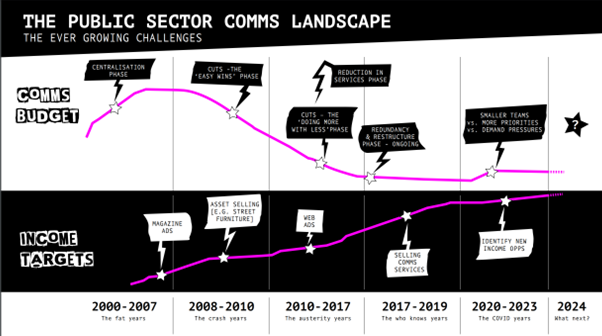Blog
CATEGORY: Public Sector
“I don’t make predictions and I never will”

I thought I would misquote Paul Gasgoine to set the tone for this piece – as it rather aptly sums up exactly the conversation Darren Caveney and I had one cold January afternoon.
After reading Darren’s newsletter, that very morning, which had opened with:
“Hello, 2024. What fun we have in store. And not a prediction or resolution in sight…
I can declare that comms2point0 is officially a prediction-free and resolution-free zone. Phew.
I gave up on ever making a prediction again after Brexit and all that’s followed since. It’s proven to be a mug’s game.”
To say I was not entirely sure how my asking him for his predictions for 2024 would go down, was an understatement to say the least.
But as we quickly discovered there is a big difference between prediction and foresight. So, the focus of this article is foresight and “educated preparation”.
So, before I start, I’d like to say a massive thank you to Darren for sharing his thoughts and insights, and I hope you find it as helpful and fascinating as I did.
Why are we here? & Where are we going?
“Sometimes I believe we need to look back at where we have come from to really understand why and how we are where we are now. The public sector comms landscape very much falls into this category.”

https://comms2point0.co.uk/comms2point0/2024/1/17/the-public-sector-comms-landscape-2024 - also credit to Alive with Ideas for bringing Darren's dream to reality
"I've tried to break the landscape down into six phases which started back in 2000 - I started in local government in 2001 - and I've called those “The fat years” because actually there was budget available to do things. It was a very different time.
It wasn’t necessarily like private sector-style budgets but there was plenty of budget, and if you wanted to do something like a new corporate identity refresh, you could. If you wanted to go and do all sorts of exciting things, you could pull a business case together and you could get it through the leadership team if they saw the merit.
Then, we have the worldwide financial crash in 2008 so I called those “The crash years” on the infographic. Then in 2010 the coalition government came in and that’s when the public sector cuts – ‘austerity’ – began.
So, what we're seeing now you can trace back to 2010 actually.
The austerity years ran from 2010 to 2017. Well actually they are still here. Those lost budgets were never replenished. 2017 to 2019 I called the “The who-knows years”, because it was Brexit – and all that that brought - plus everything else in the world that landed and it was a confusing place to operate.
And of course no timeline is complete without “the covid years” because, quite frankly what else would you call them.
There are also two pink tracking lines that run through the infographic – to show comms budgets and income targets. So, the one at the top is effectively comms budgets and the path they have taken across the last 24 years. Obviously, they started off higher but have fallen – different comms teams experienced different levels of cuts so the infographic is a general picture.
Transformation programmes kicked in and many outposted comms officers were centralised – this was a good thing. It that meant in the short time that comms budgets actually went up for some. That's why the graph goes up. But then during the crash years the cuts began to bite and that is where the so called “easy wins” came into play. Then, during the austerity years, there was quite a substantial drop in budgets and resources.
The pink graph along the bottom shows the income targets which became a real trend in an attempt, initially, the balance the lost budgets. Some teams were given huge income targets and were just not achievable. Some income generation was, though, and we say a rise in comms teams entering into the arena of street furniture agreements, web adverts, email ads, sponsorship and taking up income opportunities from resident magazines (for those who still has them)
Then we moved into the Brexit years and comms teams began sell their services more to counter the still falling budgets. Some teams had capacity and the skills to deliver comms services for other partners and that had some benefits plus could bring revenue in.
Throughout the infographic – at different times for different organisations - redundancies and restructures too place around the UK public sector - and that's still going on today.
By the time we got to the Covid years we had smaller teams but with more priorities, more pressure and greater expectations.
So, the two pink lines are almost coming together now and for some councils, they haven't got any budget left other than for their salaries. The only way they can generate anything is to do some of the stuff that's along the bottom graph.
Where are we now?
I've just called 2024 that “what’s next” and that's why I don't do predictions because I think it's more of the same, to be honest.
We will have a general election this year – May or the autumn is where the smart money is for that – and judging by the polls from recent months it points towards a new Labour government. So we might end up calling the 2024 onwards the ‘Labour years’.
Obviously AI is racing ahead and there's lots of opportunities to for comms teams to utilise that. But there are also risks around governance and security. So a lot to get to grips with.
I'm not Nostradamus, it’s why I don't do predictions.
So where does that leave us?
After chatting with Darren I was reminded of the Rumsfeld Matrix (and for those not familiar with this there are effectively 4 stages of knowledge/understanding. I'm only going to use the 3 here though: 1. Known, knowns 2. Known unknowns, 3. Unknown unknowns....
So what do we think we know: Known knowns
The pink lines of budget and strategy look set on the path to converge. And with the current financial situation it would be unrealistic to see this trend changing.
Comms teams continue to be under pressure - both financially, with multiple priorities and with reduced staff - time management and having a robust strategy (with clear – agreed by all -priorities) is critical.
Council finances - many comms teams are going to have to ride the storm of the section 114. "With talk of potentially 30% of councils being close to section 114 a whole new layer of demand and pressure are going to hot local government comms teams. The budget cuts for those in this sector have just been too great to cope and to maintain good service delivery. Some councils have lost 50% of the overall budgets since 2010. Something has to give.
Community is essential - both the communities that we serve, but also our own community. By sharing experiences, best practice, opportunities and supporting each other with our common goals, teams can learn and deliver based on others learnings before them.
Focus on the outcomes - Having a clear plan about what you will do - and won't do - is key, with an emphasis on organisational objectives - how can comms teams add real value, that demonstrates measurable outcomes? How can we impact falling trust? How can we support residents, patients, customers, partners and other stakeholders with what they need from us?
Known unknowns:
"Now we're all assuming there will be a new government. - What happens if there wasn't?"
AI - we have managed not to mention it too much here - but the influence and impact of AI will likely be massive - both in terms of how we can utilise it, but also how it can potentially change things in a huge way: For example, Asking AI is "predicted" to take over from the use of search engines to find out information!!
Unknown unknowns
We know about AI and generative AI, but do we really have any idea what is coming up beyond that? I'm not sure we have yet grasped quite how the world is about to change... again... In the media today the talk is of national subscription and the fears around a third world war. Scary stuff.
I opted not to talk about "unknown knowns" because through working together, working with organisations like comms2point0, LGcomms, CIPR CAN Digital and the Behaviour Change Network, the likelihood of there being an unknown known is reduced. Keeping up to date with the network of our peers helps us all stay informed and prepared for what we expect around the corner...
Closing remarks
“Comms people are always up for a challenge, keen to learn, happy to change and still manage to deliver large sprinklings of creativity in and amongst the sometimes carnage in which we ply our trade.
But it’s also helpful to remember – and point out – where we have come from and why we do what we do, in the way that we do it.”
Solutions
Email marketing healthcheck
We are confident that we can help you, which is why we offer a free healthcheck to identify potential issues with your current programme and free advice on things that could be done to improve it.
